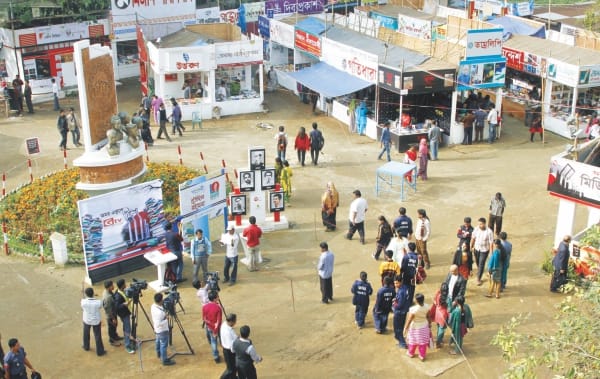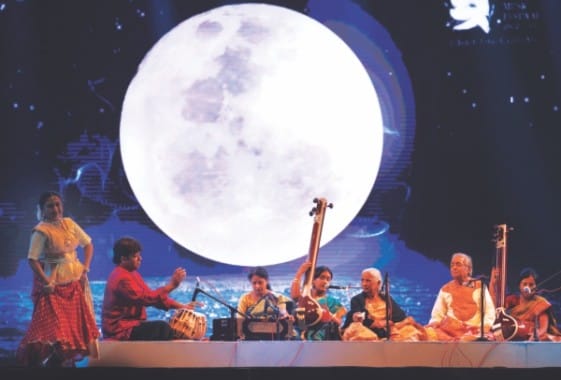DO I MISS DHAKA?
 Ekushey Boi Mela, 2013. Photo: Prabir Das
Ekushey Boi Mela, 2013. Photo: Prabir Das
Since my wife and I started splitting our time between Geneva and Dhaka, we often faced the question whether we miss Dhaka when we are in Geneva and vice versa. My answer has been in the negative, and I have been claiming that wherever I am, I get fully integrated with the place and don't miss the other. This year, we returned to Geneva on March 17. Our flight from Dhaka was on a Saturday, a day which is usually left out of the hartal purview. So we didn't have to use non-conventional means of transport (eg, ambulance) to the airport – a practice that has become popular in view of frequent hartals in recent weeks when Dhaka experienced a spate of violent political agitations. Apart from the rise in political temperature, the day temperature had also risen substantially. Although according to the Bangla calendar, the month of Choitra is regarded as part of spring, the brief season had actually ended (at least in Dhaka), giving way to the heat of summer. So, there was not much that one would miss while leaving Dhaka at such a time.
When our flight landed in Geneva, the temperature was 5 degrees celsius, which went up to eight in the afternoon. The following morning we woke up to a light snowfall (as if to remind us that we had come to Geneva) that continued till about mid-day. So, I asked myself, do I miss the weather in Dhaka? But as I went out for a little errand around mid-day and again in the afternoon for my three-km walk, I couldn't say that I was missing Dhaka. And yet, I couldn't help looking back to recount what the stay in Dhaka meant for me this time.
Soon after we arrived in Dhaka in the second week of November last year, an international literary festival (known as Hay Festival) came to Dhaka. It was a three-day event bringing together a large number of writers from Bangladesh and abroad. Held at the premises of Bangla Academy, it was not only intellectually stimulating but also provided an ideal environment for lovers of literature to enjoy the mild breeze and the soft glow of hemanta. That was followed by a three-day festival of Indian classical music that brought together more than 100 artistes from Bangladesh and India, and a smaller festival to commemorate the birth centenary of Ustad Amir Khan. By then, winter had set in and many more cultural events, small and large, were being held. The last of those that we were able to attend (we couldn't attend many due to conflicting schedules) was an evening of Rabindra Sangeet by Shama Rahman. The events that we missed included performances by Aditi Mohsin and Laisa Ahmed Lisa. However, I was able to procure the latest albums of these two renowned artistes.
When winter is on its way out, Dhaka sees the beginning of the month-long book fair starting on 1 February. Originating from the display of a few books in 1972 by Chitta Ranjan Saha, the owner of Muktodhara, this fair has now become an integral part of Dhaka life, and something which I keep looking forward to. I normally make a few visits to the fair during the month; but this year, I could go only twice as I was away from Dhaka for about a couple of weeks during the month. One book that particularly attracted my attention was the translation of Moulana Jalaluddin Rumi's poems –something which is rare in Bengali.
 Classical Music Festival, Dhaka 2012. Photo: Star File
Classical Music Festival, Dhaka 2012. Photo: Star File
What did Dhaka provide on the personal front? The highlights included visits by all the three kids with the respective spouses and by other family members from far and near. A high point during those visits was a nostalgic trip to my wife's ancestral home town Mymensingh, although the journey itself was physically demanding (due to poor roads). We were able to visit Radhasundari Girls High School – a school founded in 1927 – where my wife had her schooling. What struck me in Mymensingh was the large number of educational institutions, and later I found out that the city has one of the highest density of such institutions in relation to its population.
Despite many changes, not least being the notorious traffic jams, Dhaka remains a socially vibrant place; and we had many gatherings of family and friends around dinners, lunches, morning pitha parties, post-dinner forays into ice cream parlours, and Geneva style coffee addas – not to speak of impromptu home visits. Indeed, Dhaka now has a few coffee shops and ice cream parlours where one could have products of international standard (of course at similar prices).
As for food, especially fish, I was able to enjoy almost all that I could remember from my childhood days. The fish ranged from the tiny mourola, kajuli, and batashi to the medium ones like tangra, pubda, bacha, beley, koi, magur, etc. to big ones like aair and rohu, the latter usually bought by the Dhaka's rich, and in one instance, I was almost being elbowed out by such a person when I was looking at a good-size fish. I counted at least 16 different types of fish that we had. The leafy vegetables (i.e. shaak) still remain my favourite and I was able to enjoy them to my heart's (or stomach's?) content. The above shouldn't be taken to mean that I enjoyed any less the kachchi biriyani, delivered home from Fakhruddin's kitchen or even the chicken biriyani prepared at home by Asghar, our cook.
I cannot conclude my account of things I enjoy in Dhaka without a mention of the care extended by the members of our domestic staff. While Asghar keeps fuelling my indulgence in delicious lunches and dinners by cooking all the items that I love, the others – Salma and Jasmine – add to that by preparing pithas of different kinds. The latter started even before winter fully set in and continued well after winter was over. It's not only the preparation and serving of the items but the love and affection with which this is done is what touches me. The way they do their job sometimes creates a feeling of our being their guests. And at the end of the day, when after dinner, I relax in my reclining chair in front of the TV with a cup of coffee and ask Jasmine to bring my kantha, she would not only bring it and hand it over to me but also wrap me gently with it – something which goes well beyond the call of duty of a domestic staff. I wonder whether I can still dare say, “I don't miss any place – whether it is Dhaka or Geneva”!

 For all latest news, follow The Daily Star's Google News channel.
For all latest news, follow The Daily Star's Google News channel. 



Comments